University Nursing Report: Evidence-Based Practice and Intervention
VerifiedAdded on 2023/01/13
|7
|1140
|23
Report
AI Summary
This report provides an in-depth analysis of evidence-based nursing practices, focusing on the application of the transtheoretical model of behavioral change within the context of a clinical project. The project explores the impact of psychological interventions on reducing symptoms of depression and post-traumatic stress disorder (PTSD) among military veterans, specifically addressing suicidal ideation. The report details the six stages of the transtheoretical model (precontemplation, contemplation, preparation, action, maintenance, and termination) and explains how each stage is applied throughout the implementation of mindfulness-based cognitive behavioral therapy. It also includes a discussion of the research methodology, participant recruitment, intervention processes, and the expected outcomes. The report highlights the relevance of the model in promoting behavioral changes and improving mental health outcomes for veterans, supported by relevant literature and references.
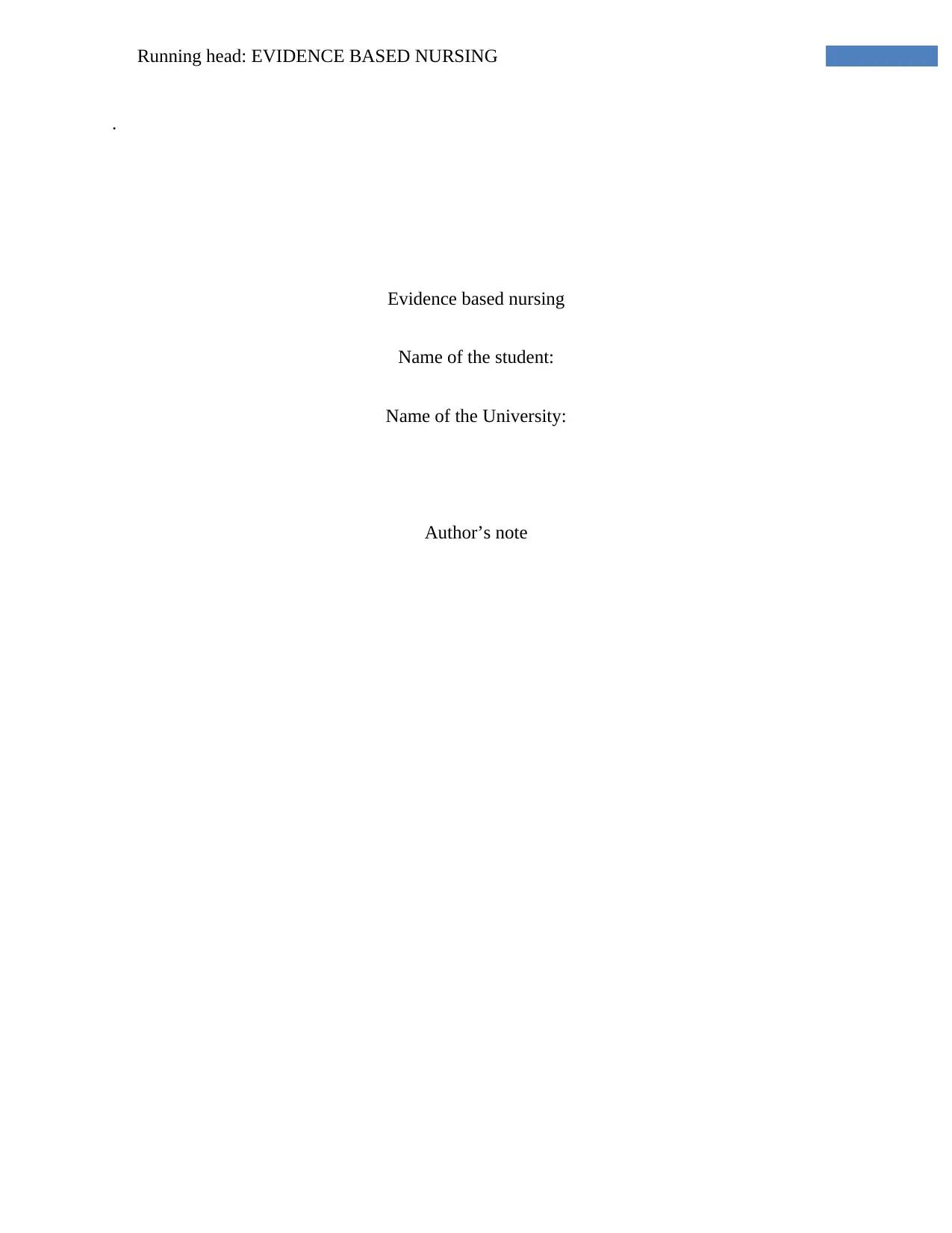
Running head: EVIDENCE BASED NURSING
.
Evidence based nursing
Name of the student:
Name of the University:
Author’s note
.
Evidence based nursing
Name of the student:
Name of the University:
Author’s note
Paraphrase This Document
Need a fresh take? Get an instant paraphrase of this document with our AI Paraphraser
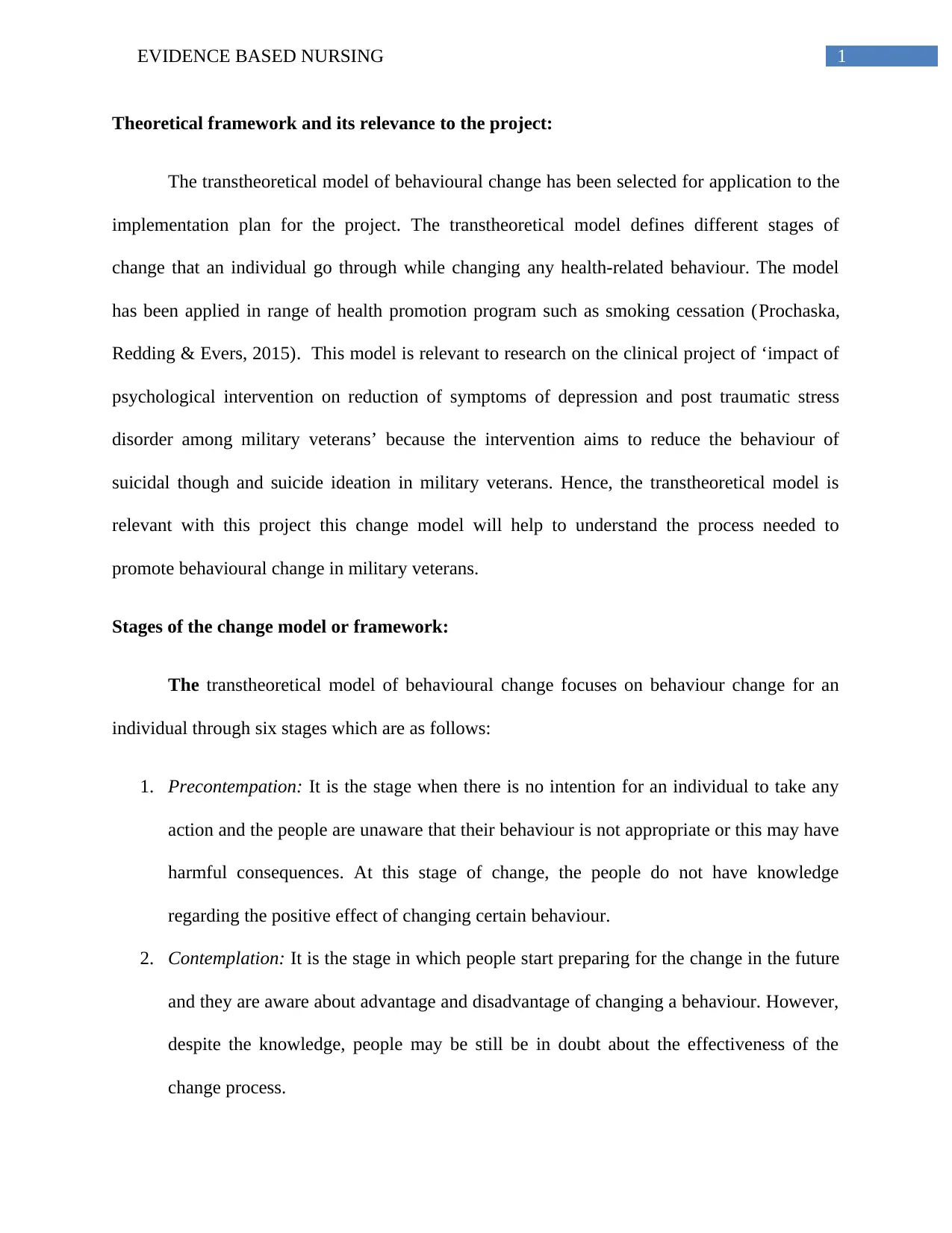
1EVIDENCE BASED NURSING
Theoretical framework and its relevance to the project:
The transtheoretical model of behavioural change has been selected for application to the
implementation plan for the project. The transtheoretical model defines different stages of
change that an individual go through while changing any health-related behaviour. The model
has been applied in range of health promotion program such as smoking cessation (Prochaska,
Redding & Evers, 2015). This model is relevant to research on the clinical project of ‘impact of
psychological intervention on reduction of symptoms of depression and post traumatic stress
disorder among military veterans’ because the intervention aims to reduce the behaviour of
suicidal though and suicide ideation in military veterans. Hence, the transtheoretical model is
relevant with this project this change model will help to understand the process needed to
promote behavioural change in military veterans.
Stages of the change model or framework:
The transtheoretical model of behavioural change focuses on behaviour change for an
individual through six stages which are as follows:
1. Precontempation: It is the stage when there is no intention for an individual to take any
action and the people are unaware that their behaviour is not appropriate or this may have
harmful consequences. At this stage of change, the people do not have knowledge
regarding the positive effect of changing certain behaviour.
2. Contemplation: It is the stage in which people start preparing for the change in the future
and they are aware about advantage and disadvantage of changing a behaviour. However,
despite the knowledge, people may be still be in doubt about the effectiveness of the
change process.
Theoretical framework and its relevance to the project:
The transtheoretical model of behavioural change has been selected for application to the
implementation plan for the project. The transtheoretical model defines different stages of
change that an individual go through while changing any health-related behaviour. The model
has been applied in range of health promotion program such as smoking cessation (Prochaska,
Redding & Evers, 2015). This model is relevant to research on the clinical project of ‘impact of
psychological intervention on reduction of symptoms of depression and post traumatic stress
disorder among military veterans’ because the intervention aims to reduce the behaviour of
suicidal though and suicide ideation in military veterans. Hence, the transtheoretical model is
relevant with this project this change model will help to understand the process needed to
promote behavioural change in military veterans.
Stages of the change model or framework:
The transtheoretical model of behavioural change focuses on behaviour change for an
individual through six stages which are as follows:
1. Precontempation: It is the stage when there is no intention for an individual to take any
action and the people are unaware that their behaviour is not appropriate or this may have
harmful consequences. At this stage of change, the people do not have knowledge
regarding the positive effect of changing certain behaviour.
2. Contemplation: It is the stage in which people start preparing for the change in the future
and they are aware about advantage and disadvantage of changing a behaviour. However,
despite the knowledge, people may be still be in doubt about the effectiveness of the
change process.
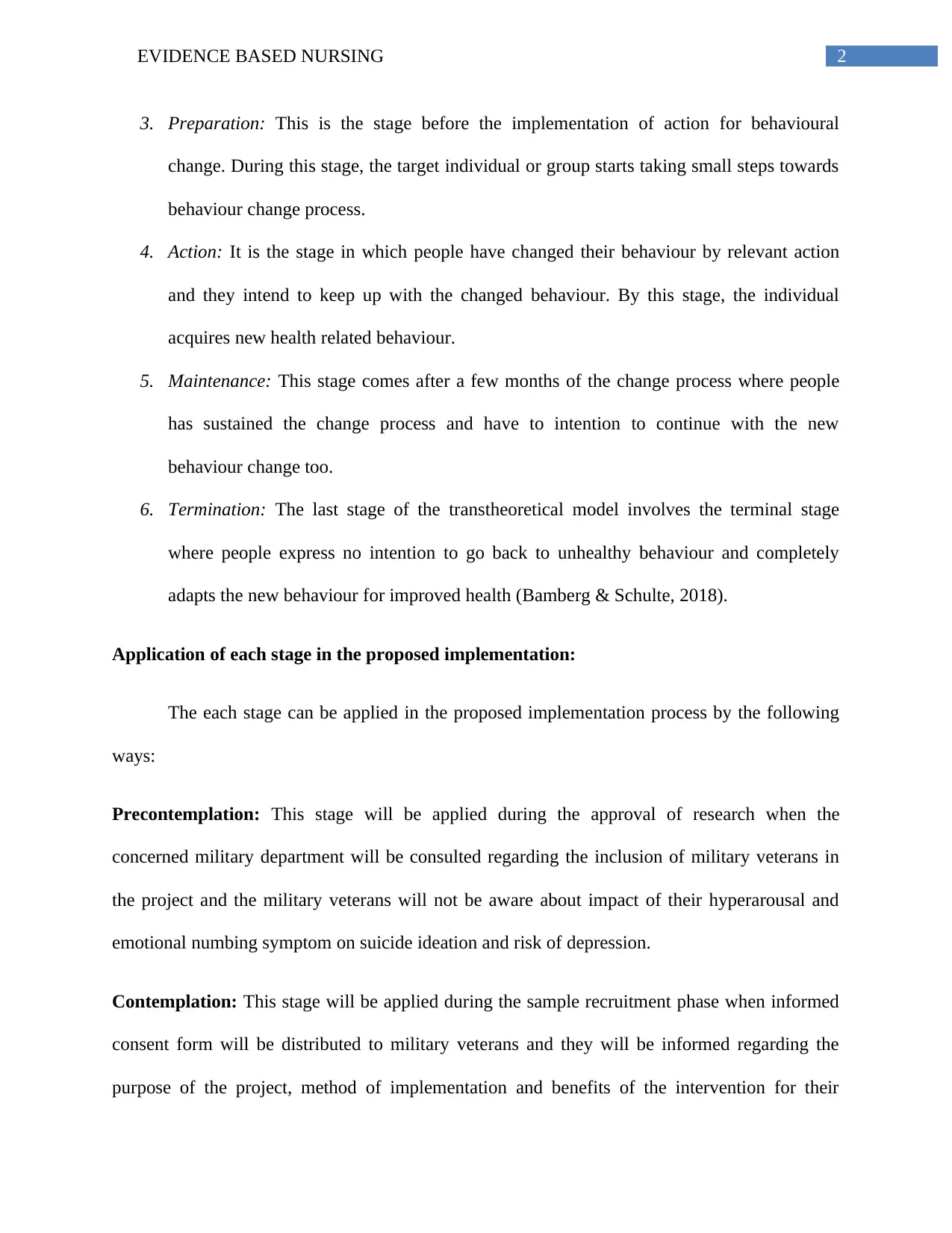
2EVIDENCE BASED NURSING
3. Preparation: This is the stage before the implementation of action for behavioural
change. During this stage, the target individual or group starts taking small steps towards
behaviour change process.
4. Action: It is the stage in which people have changed their behaviour by relevant action
and they intend to keep up with the changed behaviour. By this stage, the individual
acquires new health related behaviour.
5. Maintenance: This stage comes after a few months of the change process where people
has sustained the change process and have to intention to continue with the new
behaviour change too.
6. Termination: The last stage of the transtheoretical model involves the terminal stage
where people express no intention to go back to unhealthy behaviour and completely
adapts the new behaviour for improved health (Bamberg & Schulte, 2018).
Application of each stage in the proposed implementation:
The each stage can be applied in the proposed implementation process by the following
ways:
Precontemplation: This stage will be applied during the approval of research when the
concerned military department will be consulted regarding the inclusion of military veterans in
the project and the military veterans will not be aware about impact of their hyperarousal and
emotional numbing symptom on suicide ideation and risk of depression.
Contemplation: This stage will be applied during the sample recruitment phase when informed
consent form will be distributed to military veterans and they will be informed regarding the
purpose of the project, method of implementation and benefits of the intervention for their
3. Preparation: This is the stage before the implementation of action for behavioural
change. During this stage, the target individual or group starts taking small steps towards
behaviour change process.
4. Action: It is the stage in which people have changed their behaviour by relevant action
and they intend to keep up with the changed behaviour. By this stage, the individual
acquires new health related behaviour.
5. Maintenance: This stage comes after a few months of the change process where people
has sustained the change process and have to intention to continue with the new
behaviour change too.
6. Termination: The last stage of the transtheoretical model involves the terminal stage
where people express no intention to go back to unhealthy behaviour and completely
adapts the new behaviour for improved health (Bamberg & Schulte, 2018).
Application of each stage in the proposed implementation:
The each stage can be applied in the proposed implementation process by the following
ways:
Precontemplation: This stage will be applied during the approval of research when the
concerned military department will be consulted regarding the inclusion of military veterans in
the project and the military veterans will not be aware about impact of their hyperarousal and
emotional numbing symptom on suicide ideation and risk of depression.
Contemplation: This stage will be applied during the sample recruitment phase when informed
consent form will be distributed to military veterans and they will be informed regarding the
purpose of the project, method of implementation and benefits of the intervention for their
⊘ This is a preview!⊘
Do you want full access?
Subscribe today to unlock all pages.

Trusted by 1+ million students worldwide
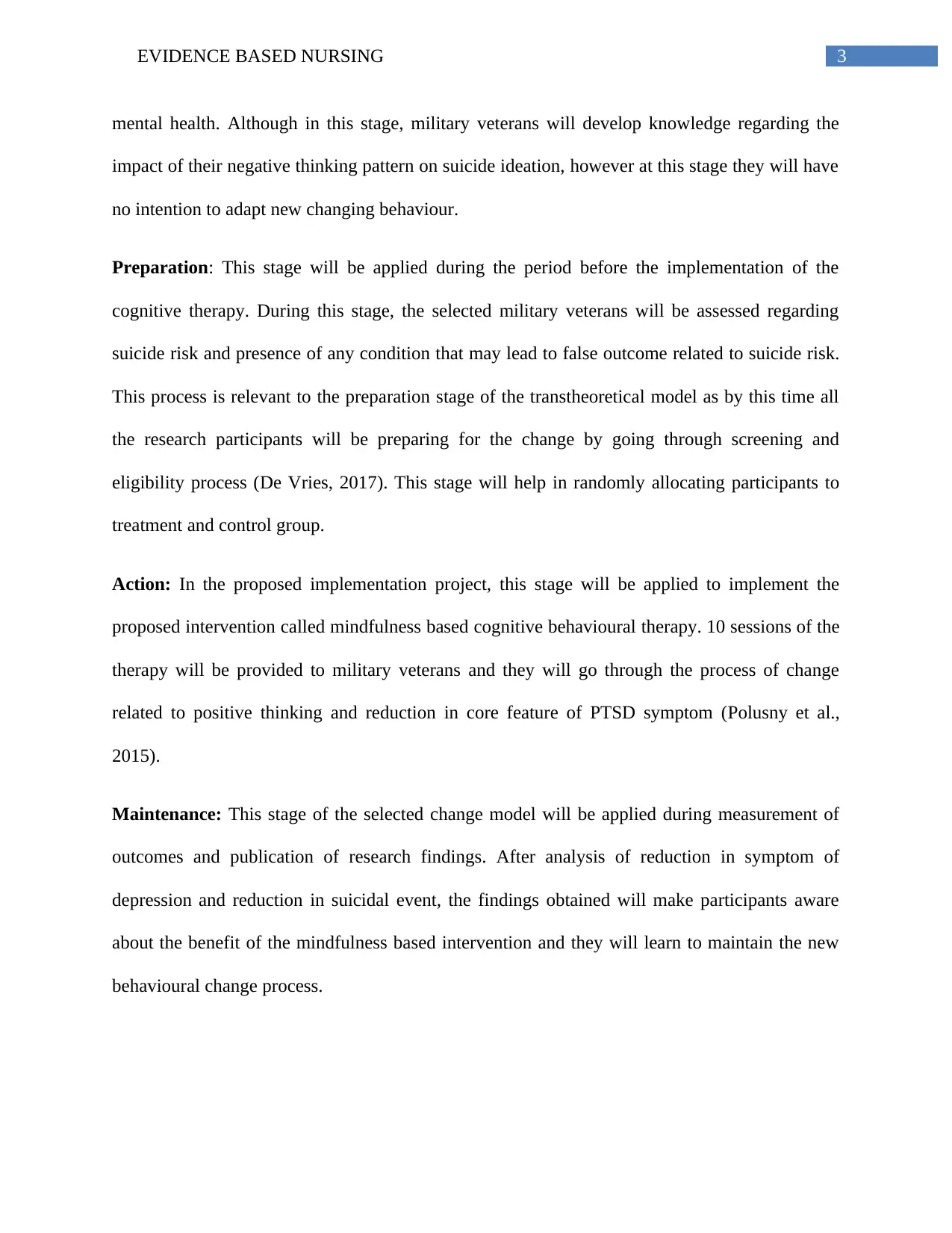
3EVIDENCE BASED NURSING
mental health. Although in this stage, military veterans will develop knowledge regarding the
impact of their negative thinking pattern on suicide ideation, however at this stage they will have
no intention to adapt new changing behaviour.
Preparation: This stage will be applied during the period before the implementation of the
cognitive therapy. During this stage, the selected military veterans will be assessed regarding
suicide risk and presence of any condition that may lead to false outcome related to suicide risk.
This process is relevant to the preparation stage of the transtheoretical model as by this time all
the research participants will be preparing for the change by going through screening and
eligibility process (De Vries, 2017). This stage will help in randomly allocating participants to
treatment and control group.
Action: In the proposed implementation project, this stage will be applied to implement the
proposed intervention called mindfulness based cognitive behavioural therapy. 10 sessions of the
therapy will be provided to military veterans and they will go through the process of change
related to positive thinking and reduction in core feature of PTSD symptom (Polusny et al.,
2015).
Maintenance: This stage of the selected change model will be applied during measurement of
outcomes and publication of research findings. After analysis of reduction in symptom of
depression and reduction in suicidal event, the findings obtained will make participants aware
about the benefit of the mindfulness based intervention and they will learn to maintain the new
behavioural change process.
mental health. Although in this stage, military veterans will develop knowledge regarding the
impact of their negative thinking pattern on suicide ideation, however at this stage they will have
no intention to adapt new changing behaviour.
Preparation: This stage will be applied during the period before the implementation of the
cognitive therapy. During this stage, the selected military veterans will be assessed regarding
suicide risk and presence of any condition that may lead to false outcome related to suicide risk.
This process is relevant to the preparation stage of the transtheoretical model as by this time all
the research participants will be preparing for the change by going through screening and
eligibility process (De Vries, 2017). This stage will help in randomly allocating participants to
treatment and control group.
Action: In the proposed implementation project, this stage will be applied to implement the
proposed intervention called mindfulness based cognitive behavioural therapy. 10 sessions of the
therapy will be provided to military veterans and they will go through the process of change
related to positive thinking and reduction in core feature of PTSD symptom (Polusny et al.,
2015).
Maintenance: This stage of the selected change model will be applied during measurement of
outcomes and publication of research findings. After analysis of reduction in symptom of
depression and reduction in suicidal event, the findings obtained will make participants aware
about the benefit of the mindfulness based intervention and they will learn to maintain the new
behavioural change process.
Paraphrase This Document
Need a fresh take? Get an instant paraphrase of this document with our AI Paraphraser

4EVIDENCE BASED NURSING
Termination: This stage will include the final phase of research when all findings and its
relevant implications are discussed and the involved participants continue to adhere to the new
behaviour in the future too.
Termination: This stage will include the final phase of research when all findings and its
relevant implications are discussed and the involved participants continue to adhere to the new
behaviour in the future too.
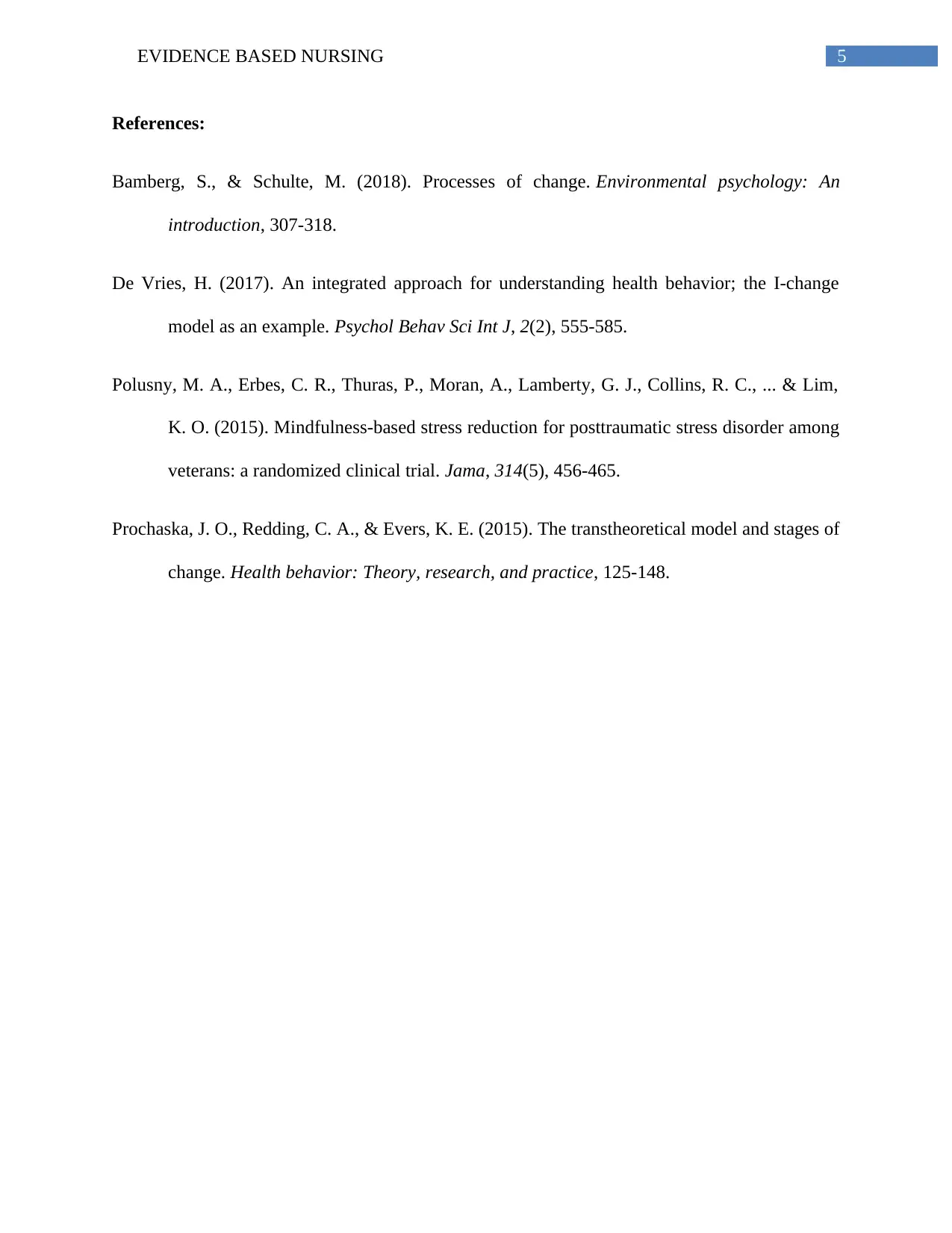
5EVIDENCE BASED NURSING
References:
Bamberg, S., & Schulte, M. (2018). Processes of change. Environmental psychology: An
introduction, 307-318.
De Vries, H. (2017). An integrated approach for understanding health behavior; the I-change
model as an example. Psychol Behav Sci Int J, 2(2), 555-585.
Polusny, M. A., Erbes, C. R., Thuras, P., Moran, A., Lamberty, G. J., Collins, R. C., ... & Lim,
K. O. (2015). Mindfulness-based stress reduction for posttraumatic stress disorder among
veterans: a randomized clinical trial. Jama, 314(5), 456-465.
Prochaska, J. O., Redding, C. A., & Evers, K. E. (2015). The transtheoretical model and stages of
change. Health behavior: Theory, research, and practice, 125-148.
References:
Bamberg, S., & Schulte, M. (2018). Processes of change. Environmental psychology: An
introduction, 307-318.
De Vries, H. (2017). An integrated approach for understanding health behavior; the I-change
model as an example. Psychol Behav Sci Int J, 2(2), 555-585.
Polusny, M. A., Erbes, C. R., Thuras, P., Moran, A., Lamberty, G. J., Collins, R. C., ... & Lim,
K. O. (2015). Mindfulness-based stress reduction for posttraumatic stress disorder among
veterans: a randomized clinical trial. Jama, 314(5), 456-465.
Prochaska, J. O., Redding, C. A., & Evers, K. E. (2015). The transtheoretical model and stages of
change. Health behavior: Theory, research, and practice, 125-148.
⊘ This is a preview!⊘
Do you want full access?
Subscribe today to unlock all pages.

Trusted by 1+ million students worldwide
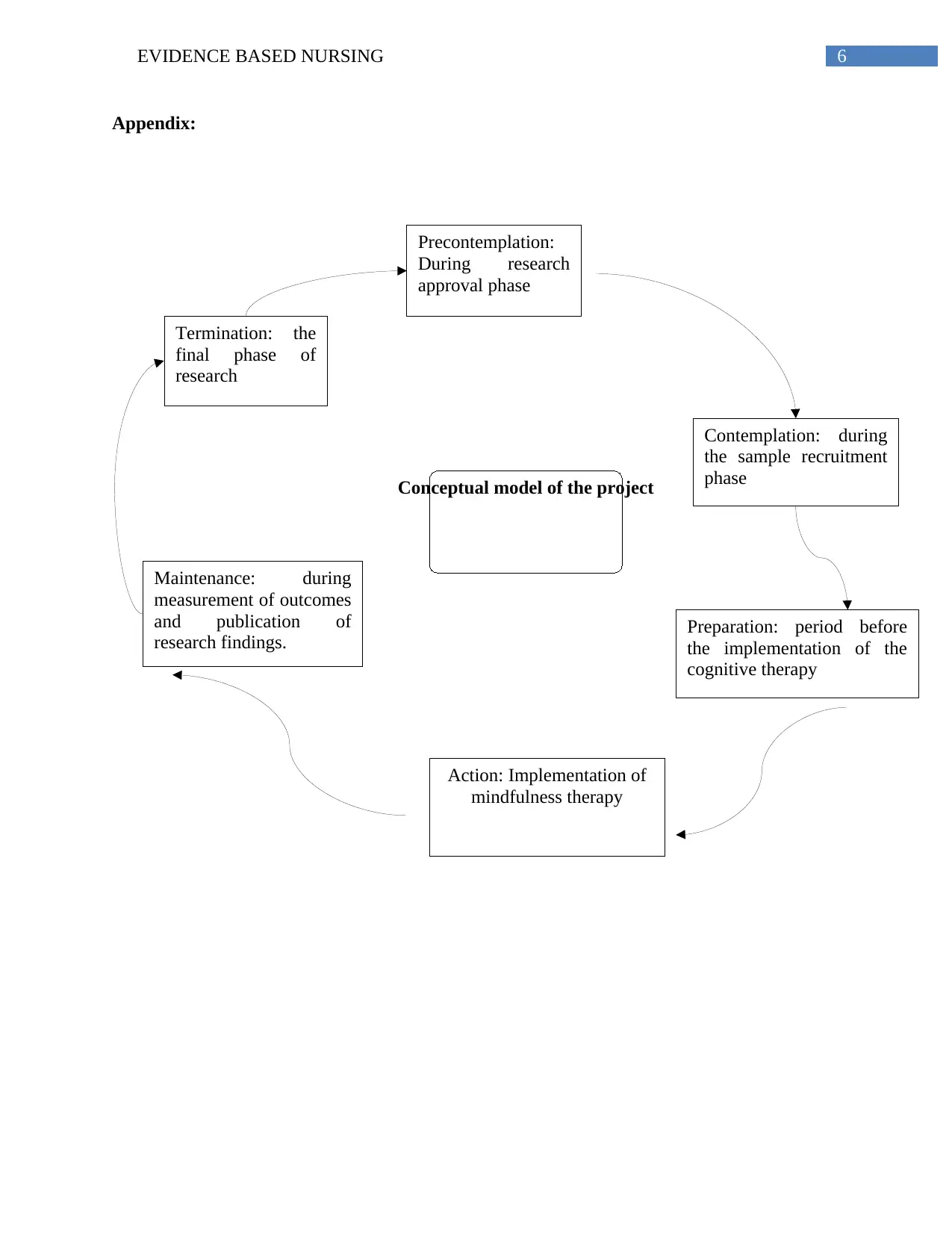
6EVIDENCE BASED NURSING
Precontemplation:
During research
approval phase
Contemplation: during
the sample recruitment
phase
Preparation: period before
the implementation of the
cognitive therapy
Action: Implementation of
mindfulness therapy
Termination: the
final phase of
research
Maintenance: during
measurement of outcomes
and publication of
research findings.
Conceptual model of the project
Appendix:
Precontemplation:
During research
approval phase
Contemplation: during
the sample recruitment
phase
Preparation: period before
the implementation of the
cognitive therapy
Action: Implementation of
mindfulness therapy
Termination: the
final phase of
research
Maintenance: during
measurement of outcomes
and publication of
research findings.
Conceptual model of the project
Appendix:
1 out of 7
Related Documents
Your All-in-One AI-Powered Toolkit for Academic Success.
+13062052269
info@desklib.com
Available 24*7 on WhatsApp / Email
![[object Object]](/_next/static/media/star-bottom.7253800d.svg)
Unlock your academic potential
Copyright © 2020–2026 A2Z Services. All Rights Reserved. Developed and managed by ZUCOL.





